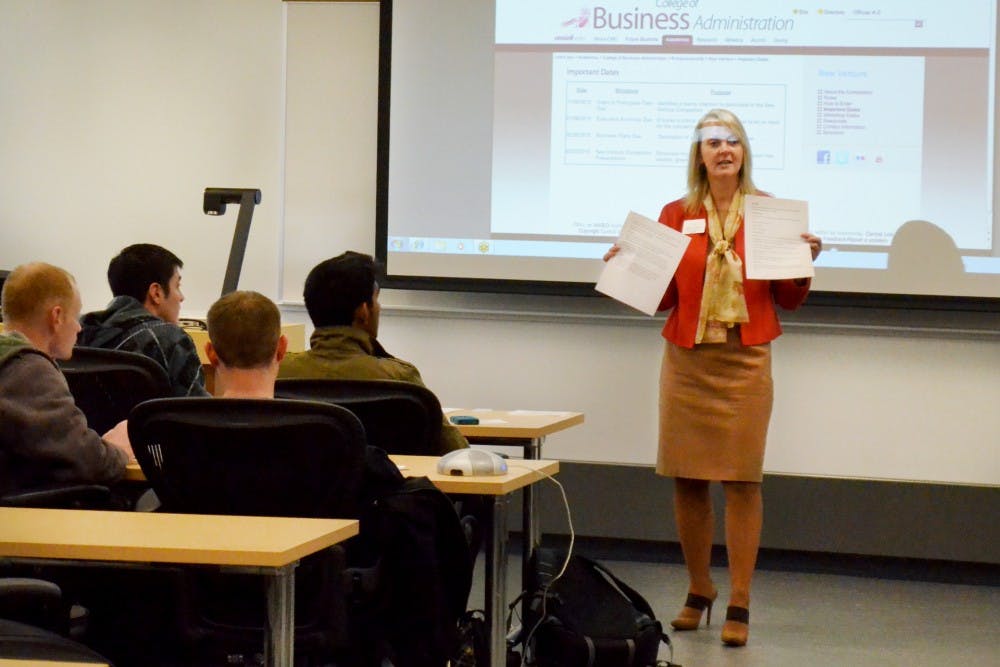New Venture competition workshop helps students learn how to master a two-minute pitch

Aspiring entrepreneurs learned how to master a two-minute pitch in Grawn Hall on Wednesday during the New Venture Competition workshop.
Sponsored by Stroh Companies, Inc., the workshop series is aimed at helping students make a perfect pitch to potential investors.
Executive Director of Great Lakes Entrepreneur’s Quest (GLEQ) and entrepreneur Diane Durance gave a presentation on how students can succeed when giving a pitch.
“There’s an art form around doing a two-minute investor pitch, and you want to be sure that in those two minutes, you cover everything you can possibly cover to generate their interests,” Durance said.
Nick Houghton, a facilitator and member of the Central Michigan University Research Corporation, met with students and gave them advice on how to pitch during the workshop. The Shepherd native helped guide them through the process and explained that you have to do more than just pitch, but pitch well.
“Two-minute pitch will capture the audience,” Houghton said. “If you don’t capture your audience within that first two minutes, it is very tough to get a sit-down meeting or to move your project forward. So being able to capture the audience and intrigue that investor, per se, to sit down with you is very essential in moving your company forward.”
Durance said one of the most common errors she notices when people are giving pitches is a lack of practice.
“The first thing that is very common is not practicing it,” Durance said. “Not really thinking ahead about what you want to say, what points you want to make, being sure you can say them in two minutes, because two minutes seems like it might be a lot of time, but it’s really not. You can’t say a lot in two minutes, so if you haven’t planned in advance, you’re going to just lose that time, and you’re not going to make the points that you want to make.”
Durance said it is also important to keep in mind that investors want you to answer the questions "Is there a market for this?" and "Is there potential to really grow a business around this?" Durance said it is important for students, regardless of their majors, to know how to sell themselves.
“I think doing a two-minute presentation on rather it’s your new business or your own introduction of yourself and your capabilities and interests is really important to master, because you’re going to have lots of opportunities, whether it’s a job interview,” Durance said.
Charles Crespy, dean of the College of Business and Administration, attended the event and said Durance’s speech was helpful. He said it is important to know how to give a two-minute pitch, because first impressions are always important.
“It’s cliché to say that you only get one chance to make a first impression, but, in this world where people go after angel investor funds and venture capital funds, you really do get a very limited opportunity to commit to people that you have a dynamic idea,” Crespy said. “Not only is your idea good but that you’re passionate enough about your idea and people want to invest in you, and I think the advice today was very helpful and kind of visualizing what one needs to do to earn the support of angel investors and venture capital investors.”
Debra Zellner, Executive Director of the Isabella Bank Institute for Entrepreneurship, and the staff at the Isabella Bank Institute have been working with CMU during the competition to try to prepare students for successful business careers.
“Most of our majors prepare people to go to work for other people; the entrepreneurship program prepares students to forge their own career,” Crespy said. “These programs, the New Venture seminars, help students create a vision for how they might design, invent, promote a business idea that they have.”



